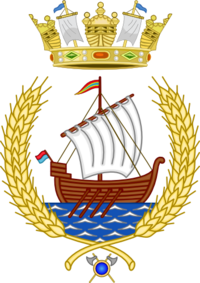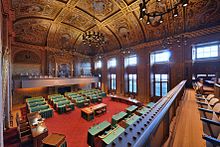Parliament of Sasora: Difference between revisions
(Created page with "{{Infobox legislature | name = Parliament of Sasora | native_name = Concillium Sasorae<br>Parlement de Sasore | coa_pic = Coat of Arms of Sasor...") |
|||
| Line 38: | Line 38: | ||
There are 79 members of parliament: 60 chosen by election to single-member districts and 19 mayors. Elections to parliament are held every four years, though early elections can be called by the [[Monarchy of Latium|Monarch]]. Members of parliament serving as mayors are not elected in ordinary general elections, and are afforded their seats ex offico due to their mayoral election. Following a 1984 amendment to the Imperial Charter, no individual may hold more than one seat in Parliament. This occurred in 1981 when Oliver Courcouis was elected to parliament while also serving as Mayor of Oufey <!--or Caulbonne-->; all mayors are ineligible for standing for election to Parliament. | There are 79 members of parliament: 60 chosen by election to single-member districts and 19 mayors. Elections to parliament are held every four years, though early elections can be called by the [[Monarchy of Latium|Monarch]]. Members of parliament serving as mayors are not elected in ordinary general elections, and are afforded their seats ex offico due to their mayoral election. Following a 1984 amendment to the Imperial Charter, no individual may hold more than one seat in Parliament. This occurred in 1981 when Oliver Courcouis was elected to parliament while also serving as Mayor of Oufey <!--or Caulbonne-->; all mayors are ineligible for standing for election to Parliament. | ||
==Functions== | ==Functions== | ||
The Parliament is only to legislate on matters devolved to the provincial Sasoran government in the 1979 Imperial Charter. All matters not explicitly laid out in the Charter remain with the central government in [[Castellum]]. Unlike other devolved assemblies in Latium, the Parliament of Sasora has full taxable powers, enabling it to enact income tax, and other tax liabilities for residents of Sasora. Sasora has specific authority over economic development, education, environment (including fisheries and forestry), consumer affairs and advocacy, health, home affairs (including public services, waste management, and fire and law enforcement), legal system (including courts and supervision of the legal profession), local government, sport and the arts, and some aspects of transportation. Any legislation enacted by Sasoran Parliament must attain Imperial assent. | |||
==Parliamentary leaders== | ==Parliamentary leaders== | ||
==See also== | ==See also== | ||
[[category:Sasora]] | [[category:Sasora]] | ||
Revision as of 00:39, 21 August 2019
Parliament of Sasora Concillium Sasorae Parlement de Sasore | |
|---|---|
 | |
| Type | |
| Type | |
| Leadership | |
Speaker | Azelma Pelana since 3 April 2013 |
Majority Leader | |
| Structure | |
| Seats | 79 |
 | |
Political groups |
|
| Elections | |
| First-past-the-post voting and Indirect election | |
Last election | 9 June 2017 |
| Meeting place | |
 | |
| Council Chamber Palatium Insulae, Caetot, Sasora, Latium | |
The Parliament of Sasora (Latin: Concillium Sasorae; Sasoran: Parlement de Sasore), sometimes referred to as the Senate of Sasora, is the unicameral provincial legislature of Sasora. It has existed in its current form since 1979 when it was created by Imperial Charter. It is located at Palatium Insulae, in Caetot, Sasora.
Electoral districts are different than the vast majority of local councils in Latium. The province is divided into 60 single-member constituencies. In addition, 19 special electoral districts send a municipal mayor to Parliament; these districts often overlap with normal constituencies.
Elections and membership
There are 79 members of parliament: 60 chosen by election to single-member districts and 19 mayors. Elections to parliament are held every four years, though early elections can be called by the Monarch. Members of parliament serving as mayors are not elected in ordinary general elections, and are afforded their seats ex offico due to their mayoral election. Following a 1984 amendment to the Imperial Charter, no individual may hold more than one seat in Parliament. This occurred in 1981 when Oliver Courcouis was elected to parliament while also serving as Mayor of Oufey ; all mayors are ineligible for standing for election to Parliament.
Functions
The Parliament is only to legislate on matters devolved to the provincial Sasoran government in the 1979 Imperial Charter. All matters not explicitly laid out in the Charter remain with the central government in Castellum. Unlike other devolved assemblies in Latium, the Parliament of Sasora has full taxable powers, enabling it to enact income tax, and other tax liabilities for residents of Sasora. Sasora has specific authority over economic development, education, environment (including fisheries and forestry), consumer affairs and advocacy, health, home affairs (including public services, waste management, and fire and law enforcement), legal system (including courts and supervision of the legal profession), local government, sport and the arts, and some aspects of transportation. Any legislation enacted by Sasoran Parliament must attain Imperial assent.